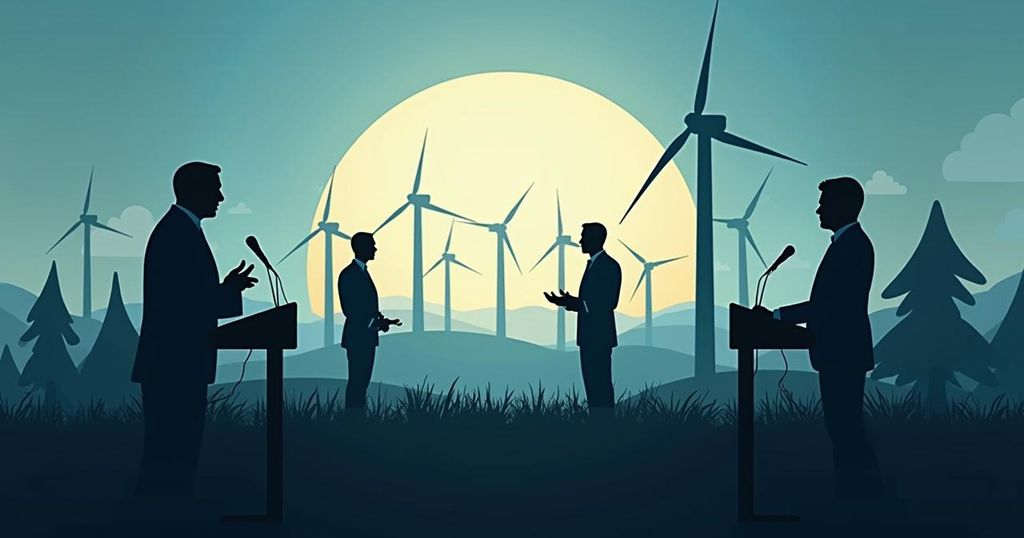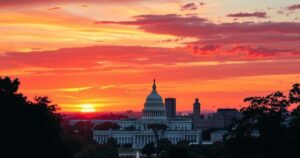Vice Presidential Debate: Walz and Vance Clash on Clean Energy and Job Creation

During the vice presidential debate, JD Vance and Tim Walz debated on clean energy and job creation strategies, responding to climate change concerns following Hurricane Helene. Vance criticized the current administration’s impact, while Walz defended significant legislative achievements, particularly the Inflation Reduction Act, which has initiated considerable job growth in the clean energy sector. The candidates presented starkly different views on how to bolster U.S. industrial capabilities and counter China’s dominance in the renewable energy market.
In a spirited vice presidential debate held on Tuesday, JD Vance, the Republican nominee, and Tim Walz, the Democratic candidate, engaged in a robust discussion regarding clean energy initiatives and the growth of industrial jobs. This exchange was triggered by a query from CBS News moderators Norah O’Donnell and Margaret Brennan concerning combatting climate change, particularly in light of the devastation wrought by Hurricane Helene. Senator Vance asserted, “If we actually care about getting cleaner air and cleaner water, the best thing to do is to double down and invest in American workers and the American people. And unfortunately, Kamala Harris has done exactly the opposite.” In contrast, Governor Walz emphasized the historical significance of the Biden administration’s investments, highlighting that the Inflation Reduction Act has catalyzed job creation across the nation, claiming it has resulted in approximately 240,000 jobs being generated. However, it is noteworthy that some analyses, such as one from the environmental think tank E2, estimate the figure to be closer to 105,000 jobs as of May 2024. The Inflation Reduction Act, adopted in 2022, represents a monumental step in climate action and manufacturing investment, providing critical tax credits for clean energy production and technologies such as electric vehicles (EVs). Governor Walz noted specific job growth in the EV sector, citing over 2,000 jobs anticipated in Jeffersonville, Ohio, due to the establishment of a new battery plant developed by LG Energy Solution and Honda. While this facility was already in the planning phase prior to the enactment of the Inflation Reduction Act, its future may still benefit from the act’s provisions. Senator Vance, on the other hand, refrained from acknowledging any positive impacts resulting from these legislative efforts. Instead, he emphasized the need to bolster American manufacturing and insisted on the importance of increasing energy production domestically, stating, “…because we’re the cleanest economy in the entire world.” Vance pointed to China’s dominance in solar panel production as a concern, suggesting that Harris’s policies promote more energy production abroad rather than at home. Looking at the broader context, many of the Biden administration’s strategies aim to strengthen U.S. supply chains for essential energy technologies to mitigate China’s lead in the EV and clean energy industries. Furthermore, Vance proposed that the U.S. should enhance its clean energy output by investing more in nuclear facilities and boosting natural gas investments, both of which are also being pursued under the current administration. Overall, the debate underscored the stark differences between the candidates’ visions for energy policy and economic growth, highlighting competing narratives regarding the efficacy of current and proposed energy initiatives.
The recent vice presidential debate between JD Vance and Tim Walz focused on the critical topics of clean energy and job creation amid increasing concerns about climate change. The candidates articulated their respective party platforms regarding economic policies, specifically the role of legislative measures like the Inflation Reduction Act in facilitating job growth within the clean energy sector. This debate also reflects broader issues concerning U.S. manufacturing capabilities in a competitive global economy, particularly in light of China’s influence in the clean energy market.
The vice presidential debate highlighted the contrasting viewpoints of JD Vance and Tim Walz on clean energy and job creation. Vance underscored a need for increased domestic manufacturing and energy independence while criticizing the current administration’s approach. In contrast, Walz pointed to historical legislative achievements under the Biden-Harris administration, particularly the Inflation Reduction Act, as pivotal in fostering job growth and combating climate change. This exchange exemplified the ongoing political discourse surrounding energy policies and their implications for the U.S. economy.
Original Source: www.detroitnews.com






